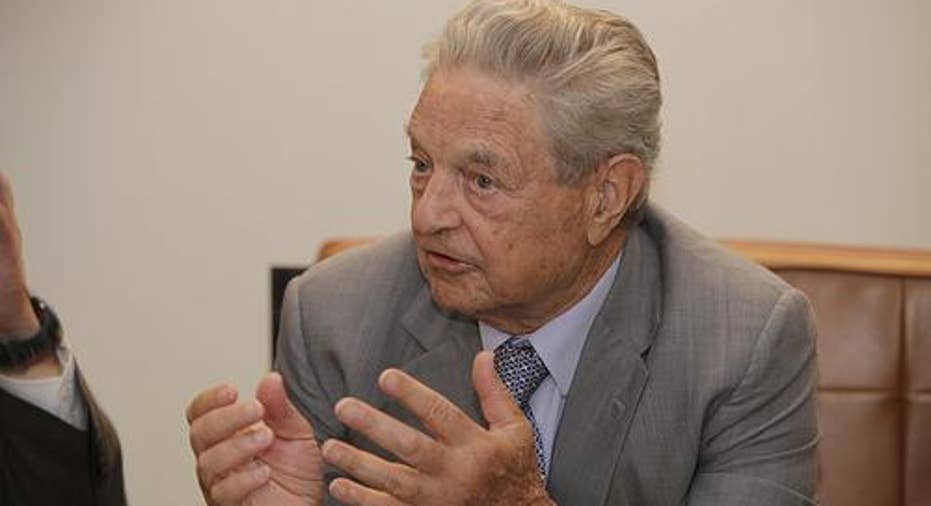Soros Lost Nearly $1 Billion in Weeks After Trump Election

Billionaire hedge-fund manager George Soros lost nearly $1 billion as a result of the stock-market rally spurred by Donald Trump's surprise presidential election.
But Stanley Druckenmiller, Mr. Soros's former deputy who helped Mr. Soros score $1 billion of profits betting against the British pound in 1992, anticipated the market's recent climb and racked up sizable gains, according to people close to the matter.
The divergent bets of the two traders are a stark reminder of the challenges even acclaimed investors have faced following Mr. Trump's unexpected victory. Many experts had predicted a tumble for stocks in the wake of the election, but instead the Dow Jones Industrial Average has climbed 9.3%.
Last year, Mr. Soros returned to trading at Soros Fund Management LLC, which manages about $30 billion for Mr. Soros and his family. Mr. Soros was lured back by the opportunities to profit from what he saw as coming economic troubles.
Mr. Soros was cautious about the market going into November and became more bearish immediately after Mr. Trump's election, according to people close to the matter. The stance proved a mistake -- the stock market has rallied on expectations that Mr. Trump's policies will boost corporate earnings and the overall economy.
As a result, some of Mr. Soros's trading positions incurred losses approaching $1 billion, the people say. Mr. Soros adjusted his positions and exited many of his bearish bets late last year, avoiding further losses, the people added.
The broader portfolio held by Mr. Soros's firm performed better, posting profits before and after the election from long-held investments in sectors including financials and industrials, according to people familiar with the firm. Those gains helped Soros Fund Management gain about 5% on the year.
Mr. Soros, chairman of the firm, continues to trade a portion of Soros Fund's cash and his positions often are quite volatile, the people said. The firm is currently interviewing candidates for a vacant chief investment officer position. Some close to the firm say Mr. Soros could play a reduced trading role when someone is hired to fill the role. In recent years, the 86-year-old billionaire has focused on public policy and philanthropy. He was a large contributor to the super PAC backing Democratic presidential nominee Hillary Clinton and has donated to other groups supporting Democrats.
Mr. Druckenmiller, who left Mr. Soros's firm in 2000 and now invests his own money, took a very different stance on the presidential election.
Days before the election, Mr. Druckenmiller predicted to an investor that if Mrs. Clinton emerged victorious the stock market likely would rally initially but then would fall. Mr. Druckenmiller said if Mr. Trump won the election, the opposite result likely would occur -- stocks first would tumble and then soar.
Mr. Druckenmiller's call was prescient.
Stock futures fell sharply on the evening of Mr. Trump's victory, but the market has since surged. Mr. Druckenmiller has publicly said on television that he exited bearish positions on the night of the election, for example, selling long-held gold. He also became bullish on certain sectors of the stock market, and said he was shorting bonds globally and expected the dollar to rally against the euro.
These trades have paid off as Mr. Druckenmiller's firm, Duquesne Family Office LLC, scored gains of more than 10% in 2016, the people say. As a private office, the firm doesn't have to disclose its assets under management.
Mr. Druckenmiller also was politically active during the campaign, donating to Ohio Gov. John Kasich. Overall, Mr. Druckenmiller gave about $3.5 million to Republican candidates, according to the Center for Responsive Politics, while Mr. Soros gave more than $20 million to Democratic candidates during the 2016 election cycle.
In October, Mr. Druckenmiller told Reuters that he backed Republican candidates for Congress in the hope of creating a "firewall" against Mrs. Clinton's likely economic policies, including more government control of health care. He also said Mr. Trump had an "unstable personality," and Mr. Druckenmiller added that he might not vote in the presidential election.
Write to Gregory Zuckerman at gregory.zuckerman@wsj.com and Juliet Chung at juliet.chung@wsj.com



















